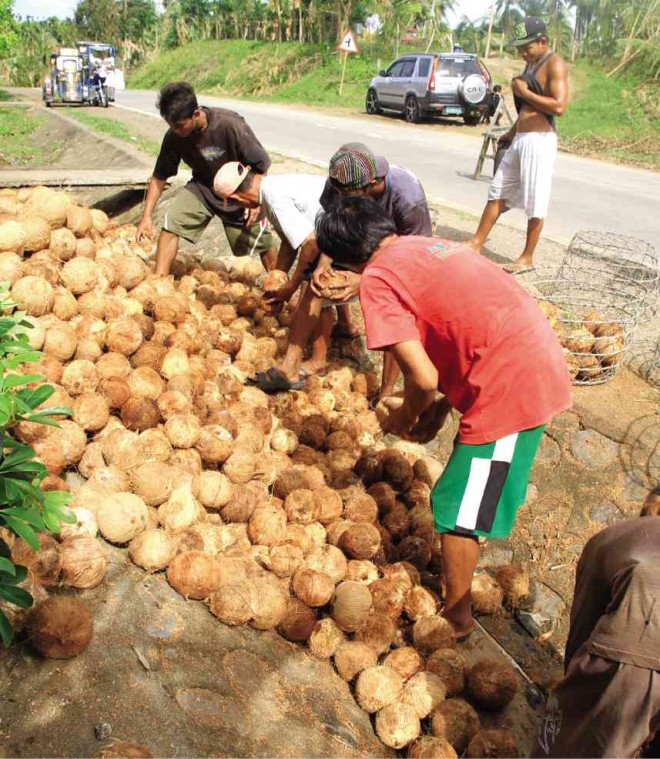House doubles coco levy trust principal, OKs bill on second reading

Young coconut farmers in Unisan, Quezon. FILE PHOTO / INQUIRER SOUTHERN LUZON / DELFIN T. MALLARI JR.
The House of Representatives has approved on second reading a measure creating the Coconut Industry Trust Fund (CCITF), which is seen to benefit the “poor and marginalized” coconut farmers, without explicitly recognizing the abuses of the Marcos regime.
Before its approval via viva-voce voting on Wednesday evening, Deputy Speaker Sharon Garin introduced several amendments to House Bill No. 5745, which were accepted by the bill’s sponsor, ANAC-IP Party-list Rep. Jose Panganiban Jr.
Through Garin’s amendment, the trust principal known as the Jumpstart Fund was doubled to P20 billion from the original proposal of P10 billion.
Garin also adjusted the bill to reflect the trust principal’s purpose to “accelerate the development of the industry for the ultimate benefit of the coconut farmers and farm workers.”
Of the said amount, Garin pitched that P7.5 billion be set aside to fund the social protection programs provided for by the House bill.
Article continues after this advertisementShe also inserted the expansion of social protection programs to include the opening of a lending window in a government bank to extend concessionary loans with interest not exceeding two percent per annum. The loans would be exclusive to “poor and marginalized coconut farmers and farm workers.”
Article continues after this advertisementGarin also sought the inclusion of the Agrarian Reform Secretary in the Coconut Farmers and Industry Development Trust Fund Committee, bringing its membership to 17.
The bill already provided seats in the proposed committee for the Secretaries of Agriculture, Finance, Trade and Industry, and the National Economic and Development Authority as well as the Philippine Coconut Authority administrator.
The committee will also be composed of three coconut farmers’ organization representatives each from Luzon, Visayas and Mindanao, and two representatives from the coconut industry sector.
Garin also sought the inclusion of “investments in profitable coconut-based enterprises” in the “allowable investments” of the trust fund. Such investments are subject to feasibility studies and investment ceilings, and will automatically accrue to the trust principal.
Lastly, her amendment also required the Presidential Commission on Good Government to furnish the House and the Senate its certified inventory report of the assets bought with the Marcos-era coconut levy.
Meanwhile, Panganiban, and the rest of the House via voice vote, rejected all amendments introduced by Gabriela Women’s Party Rep. Arlene Brosas.
Brosas wanted the declaration of policy to reflect that it is “the policy of the State to recognize the coco levy fund was exacted from poor and powerless coconut farmers during the Martial Law period.”
The House also thumbed down her proposal for a “small coconut farmers’ council” to be composed of seven from the “genuine small coconut farmers sector” and two from the women farmers’ sector to be nominated in a national general assembly of farmers.
Brosas’ proposal to replace the privatization of coconut levy assets with “revitalization” was also defeated.
In 2012, the Supreme Court ruled the fees collected during the Marcos dictatorship are state-owned and should be used solely for the benefit of coconut farmers and coconut industry.
The tax had been imposed on the farmers of the poverty-wracked industry ostensibly for their benefit, but the funds were diverted instead to investments in the United Coconut Planters Bank and San Miguel Corp., to name a few.
President Duterte suspended government work on Thursday as protests mark the 45th anniversary of the declaration of Martial Law. Former President Ferdinand Marcos had placed the entire archipelago under martial rule in 1972. /kga